- Home
- Fredric Brown
Martians, Go Home Page 14
Martians, Go Home Read online
Page 14
Got only two hundred and fifty dollars for it, too, although a few months before—while there was still such a thing as pleasure driving—it would have brought him five hundred. Well, that meant he’d be able to buy one cheaply now; for less than a hundred he’d be able to pick up something good enough to get him there and let him run into Indio for shopping—if what he had to do took him that long.
“Anything wrong, Luke?”
“Nup,” he said. “Not a thing.” And realized he might as well start preparing the groundwork for his escape. “Except that I’m a little dopey. Couldn’t sleep last night; doubt it I get more than a couple hours solid sleep all night.”
“Maybe you should go up to the room and take a nap now, darling.”
Luke pretended to hesitate. “Well—maybe later. If I get actually sleepy. Right new I fell sort of dull and logy but I doubt if I could sleep.”
“Okay. Anything special you’d like to do?”
“Hew about a few games of badminton? That just might tire me out enough so I could sleep a few hours.”
It was a little windy for badminton, but they played for half an hour—that made it half-past eight—and then Luke yawned and said that now he really was sleepy. “Maybe you’d better come up with me,” he suggested, “If you want to get anything from the room, you can, and then you won’t leave to bother me until time for lunch, if I sleep that long.”
“You go ahead; there’s nothing I’ll want. I promise not to bother you till twelve.”
He kissed her briefly, wishing it could be a longer kiss since he might not see her again for a while, and went into the building and up to the room.
He sat down at the typewriter first and wrote a note to her, telling her he loved her but that there was something important he had to do, and not to worry because he’d be back soon.
Then he found Margie’s purse and took enough money to pay cab fare into town in case he could catch a cab. It would save time if he could, but even if he had to walk all the way to the bank he could be there by eleven and that would be in plenty of time.
Then he looked out of the window to see if he could find Margie on the grounds, and couldn’t. Tried the window at the end of the hall and couldn’t see her from there either. But when he went quietly downstairs he heard her voice coming from the open doorway of Dr. Snyder’s office. “…not really worried,” he heard her saying, “but he did act just a bit strange. I don’t think, though, that he…”
He let himself quietly out of the side door and strolled to the back corner of the grounds where a grove of trees hid the fence from the buildings.
His only danger now was that someone outside the fence might see him climb it, and phone the police or the sanitarium.
But no one did.
18.
It was the fifth day of August, 1964. A few minutes before 1 P.M. in New York City. Other time zones, other times, all over the world. This was to be the big moment, maybe.
Yato Ishurti, Secretary-General of the United Nations, sat alone in a small studio at Radio City. Ready and waiting.
Hopeful and frightened.
The throat mike was in place. There were stopples in his ears to prevent aural distraction once he had started to speak. And he would close his eyes, too, the instant the man behind the control room window nodded to indicate that he was on the air, so he could not be subject to visual distraction either.
Remembering that the mike was not yet activated, he cleared his throat as he watched the little glass window and the man behind it.
He was about to speak to the largest audience that had ever listened to the voice of one man, ever, anywhere.
Barring a few savages and children too young to talk or to understand, just about every human being on Earth would listen to him—either directly or through the voice of a translator.
Hurried as they had been, preparations had been exhaustive. Every government on Earth had cooperated fully, and every active radio station in the world would pick up and rebroadcast what he had to say. Every active radio station and many that had been abandoned but quickly reactivated for the purpose. And all the ships at sea.
He must remember to speak slowly and to pause at the end of each sentence or few sentences so the thousands of translators who would relay the broadcasts in non-English-speaking countries could keep up with him.
Even tribesmen in the most primitive countries would hear; arrangements had been made wherever possible to have natives come in and listen to on-the-spot translations at the nearest receiving sets. In civilized countries every factory and office not already closed by the Depression would be closed down while employes gather around radios and P.A. systems; people staying home who had no radios were requested to join neighbors who had.
As near as matters, three billion people would be hearing him. And, as near as matters, one billion Martians. If he succeeded he would become the most famous—But lshurti pulled his mind quickly away from that selfish thought. He must think of humanity, not of himself. And if he succeeded he must retire at once, not try to capitalize on success.
If he failed—But he must not think about that either. No Martian seemed to be present in the studio, none in the part of the control room he could see through the little window.
He cleared his throat again, and just in time. He saw the man beyond the control room window flick a switch and then nod to him.
Yato Ishurti closed his eyes, and spoke.
He said: “People of the world, I speak to you and through you to our visitors from Mars. Mostly I speak to them. But it is necessary that you listen too, so that when I have spoken you can answer a question that I shall ask you.”
He said: “Martians, you have not, for whatever reason of your own, taken us into your confidence as to why you are here among us.
“Possibly you are truly vicious and evil and our pain gives you pleasure.
“Possibly your psychology, your pattern of thinking, is so alien to ours that we could not understand even if you tried to explain to us.
“But I do not believe either of these things ”
He said: “If you really are what you seem or pretend to be, quarrelsome and vindictive, we would find you, at least on rare occasion, arguing or fighting among yourselves.
“This we have never seen or heard.
“Martians, you are putting on an act, pretending to be something that you are not.”
Across Earth, there was a stir as people moved. Ishurti said: “Martians, you have an ulterior purpose in doing what you have been doing. Unless your reason is beyond my power to comprehend, unless your purpose is beyond the scope of human logic, it can and must be one of only two things.
“It can be that your purpose is good; that you came here for our good. You knew that we were divided, hating one another, warring and ever on the verge of final war. It can be that you reasoned that, being what we are, we could be united only by being given a common cause, and a common hatred that transcends our hatreds of one another and makes them now seem so ridiculous that they are difficult for us to remember.
“Or it is possible that your purpose is less benevolent, but still not inimical. It is possible that, learning we stand—or stood—on the verge of space travel, you do not want us on Mars.
“It could be that, on Mars, you are corporeal and vulnerable and that you are afraid of us; you fear that we might try to conquer you, either soon or centuries from now. Or perhaps we merely bore you—certainly our radio programs must have—and you simply do not want our company on your planet.”
He said: “If either of those basic reasons is the real one, and I believe that one or the other of them is, you knew that merely telling us to behave ourselves or to stay away from Mars would antagonize us rather than accomplish your purpose.
“You wanted us to see for ourselves and to volunteer to do as you wish.
“Is it important that we know or guess correctly which of these two basic purposes is your true one?
“Whichev
er it is, I will prove to you that you have accomplished it.”
He said: “I speak, and I shall now prove that I speak, for all the peoples of Earth.”
He said: “We pledge that we are through fighting among ourselves.
“We pledge that we shall not, we shall never, send a single spaceship to your planet—unless someday you invite us to, and I think that we might need persuading, even then.”
He said solemnly: “And now the proof. People of Earth, are you with me in both of those pledges? If you are, prove it now, wherever you are, with an affirmative in your loudest voice! But so that the translators may have caught up with me, please wait until I give the signal by saying…
“…Now!”
“YES!
“SI!
“OUI!
“DAH!
“JA!
“SIM!
“JES!
“NAM!
“SHI!
“LAH!”
And thousands of other words that all mean the same thing, simultaneously from the throat and from the heart of every human being who had been listening.
Not a no or a nyet among them.
It was the damnedest sound ever made. Compared to it an H-bomb would have been the dropping of a pin, the eruption of Krakatao would have been the faintest of whispers.
There could be no doubt that every Martian on Earth must have heard it. Had there been an atmosphere between the planets to carry sound, the Martians on Mars would have heard it.
Through ear stopples and inside a closed soundproofed broadcasting studio, Yato Ishurti heard it. And felt the building vibrate with it.
He spoke no further word to anticlimax that magnificent sound. He opened his eyes and nodded to the man in the control room to take him off the air. Sighed deeply after he had seen the switch move and reached up and took the stopples from his ears
Stood, spent emotionally, walled slowly and let himself into the little anteroom between the studio and the hallway, paused there a moment to regain his composure.
Turned by chance and saw himself in a mirror on the wall.
Saw the Martian seated cross-legged atop his head, caught its eye in the mirror, and its grin, heard it tell him, “-- you, Mack.”
Knew that he must do what he had come prepared to do in case of failure.
Took from his pocket the ceremonial knife and removed it from its sheath.
Sat himself upon the floor in the manner required by tradition. Spoke briefly to his ancestors, performed the brief preliminary ritual, and then with the knife—
Resigned as secretary-general of the United Nations.
19.
The stock market had closed at noon the day of Ishurti’s speech.
It closed at noon again on August 6th, the following day, but for a different reason; it closed for an indefinite period as a result of an emergency order issued by the President. Stocks that morning had opened at a fraction of their previous day prices (which were a fraction of their pre-Martian prices), were finding no takers and declining rapidly. The emergency order stopped trading while at least some stocks were still worth the paper they were printed on.
In an even more sweeping emergency measure that afternoon, the government decided upon and announced a ninety per cent reduction in the armed forces. In a press conference, the President admitted the desperation behind this decision; it would greatly swell the ranks of the unemployed, nevertheless the measure was necessary as the government was for all practical purposes bankrupt and it was cheaper to maintain men on relief than in uniform. And all other nations were making similar cuts.
And similarly, despite all cuts, tottering upon the verge of bankruptcy. Almost any of the established orders would have been a pushover for a revolution—except for the fact that not even the most fanatical of revolutionaries wanted to take over under such circumstances.
Harassed, beckled, hounded, helpless, hamstrung, harred and harrowed, the average citizen of the average country looked with heartfelt horror to a hideous future and hankered hungrily for a return of the good old days when his only worries were death, taxes and the hydrogen bomb.
PART THREE
The Going of the Martians
1.
In August of the year 1964 a man with the mildly improbable name of Hiram Pedro Oberdorffer, of Chicago, Illinois, invented a contraption which he called an anti-extraterrestrial subatomic supervibrator.
Mr. Oberdorffer had been educated in Heidelberg, Wisconsin. His formal education had ended at the eighth grade, but in the fifty-odd years that followed he had become an inveterate reader of popular science magazines and of science articles in Sunday supplements and elsewhere. He was an ardent theorist and, in his own words (and who are we to gainsay them), he “knew more science than most of them laboratory guys.”
He was employed, and had been for many years, as janitor of an apartment building on Dearborn Street near Grand Avenue, and lived in a basement apartment of two rooms in the same building. In one of the two rooms he cooked, ate and slept. In the other room he lived the part of his life that mattered; it was his workroom.
Besides a work bench and some power tools the workroom contained several cabinets, and in and on the cabinets and piled on the floor or in boxes were old automobile parts, old radio parts, old sewing machine parts and old vacuum cleaner parts. Not to mention parts from washing machines, typewriters, bicycles, lawn mowers, outboard motors, television sets, clocks, telephones, tinkertoys, electric motors, cameras, phonographs, electric fans, shotguns and Geiger counters. Infinite treasures in a little room.
His janitorial duties, especially in summer, were not too onerous; they left him ample time for inventing and for his only other pleasure which was, in good weather, to sit and relax and think in Bughouse Square, which was only a ten minute walk from where he lived and worked.
Bughouse Square is a city park one block square and it has another name but no one ever uses the other name. It is inhabited largely by bums, winos and crackpots. Let us leave it clearly understood, however, that Mr. Oberdorffer vas none of these. He worked for a living and he drank only beer and that in moderate quantity. Against accusations of being a crackpot, he could have proved that he was sane. He had papers to show it, given him upon his release from a mental institution where once, some years before, he had been briefly incarcerated.
Martians bothered Mr. Oberdorffer much less than they bothered most people; he had the very excellent good fortune to be completely deaf.
Oh, they bothered him some. Although he couldn’t listen, he loved to talk. You might even say that he thought out loud, since he habitually talked to himself all the while he was inventing. In which case, of course, Martian interference was no nuisance; although he couldn’t hear his own voice he knew perfectly well what he was saying to himself whether or not he was being drowned out. But he had one friend besides himself to whom he liked to talk, a man named Pete, and he found that Martians did interfere occasionally in his one-sided conversations with Pete.
Every summer Pete lived in Bughouse Square, whenever possible on the fourth bench to the left along the walk that diagonalled from the inner square toward the southeast corner. In the fall Pete always disappeared; Mr. Oberdorffer assumed, not too incorrectly, that he flew south with the birds. But the following spring Pete would be there again and Mr. Oberdorffer would take up the conversation again.
It was a very one-sided conversation indeed, for Pete was a mute. But he loved to listen to Mr. Oberdorffer, believing him to be a great thinker and a great scientist, a view with which Mr. Oberdorffer himself was in complete accord, and a few simple signals sufficed for his end of the conversation—a nod or shake of the head to indicate yes or no, a raising of the eyebrows to request further explanation or elucidation. But even these signals were rarely necessary; a look of admiration and rapt attention usually sufficed. Even more rarely was recourse to the pencil and pad of paper which Mr. Oberdorffer always carried with him necessary.
&
nbsp; Increasingly, though, this particular summer Pete had been using a new signal—cupping a hand behind his ear. It had puzzled Mr. Oberdorffer the first time Pete had used this signal, for he knew that he was talking as loudly as ever, so he had passed the pad and pencil to Pete with a request for explanation, and Pete had written: “Cant here. Marsheys too noysy.”
So Mr. Oberdorffer had obliged by talking more loudly, but it annoyed him somewhat to have to do so. (Not as much, however, as his talking so loudly—even after the interference had ceased, since he had no way of knowing when the Martians stopped heckling—annoyed the occupants of adjacent benches.)
Even when, this particular summer, Pete did not signal for an increase in volume, the conversations were no longer quite as satisfactory as they had once been. All too frequently the expression on Pete’s face showed all too clearly that he was listening to something else instead of or in addition to what Mr. Oberdorffer was telling him. And whenever at such times Mr. Oberdorffer looked about he’d see a Martian or Martians and know that he was being heckled, to Pete’s distraction and therefore indirectly to his own.
Mr. Oberdorffer began to toy with the idea of doing something about the Martians.
But it wasn’t until in mid-August that he definitely decided to do something about them. In mid-August Pete suddenly disappeared from Bughouse Square. For several days running, Mr. Oberdorffer failed to find him there and he started to ask the occupants of other benches—those whom he had seen often enough to recognize as regulars—what had happened to Pete. For a while he got nothing but head shakes or other obvious disclaimers such as shrugs; then a man with a gray beard started to explain something to him so Mr. Oberdorffer said that he was deaf and handed over the pad and pencil. A temporary difficulty arose when the bearded one turned out to be unable to read or write, but between them they found an intermediary who was barely sober enough to listen to gray beard’s story and put it in writing for Mr. Oberdorffer to read. Pete was in jail.

 Hall of Mirrors
Hall of Mirrors Honeymoon in Hell
Honeymoon in Hell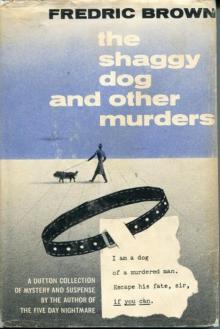 The Shaggy Dog and Other Murders
The Shaggy Dog and Other Murders The Far Cry
The Far Cry Arena
Arena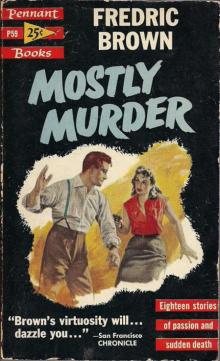 Mostly Murder
Mostly Murder The Geezenstacks
The Geezenstacks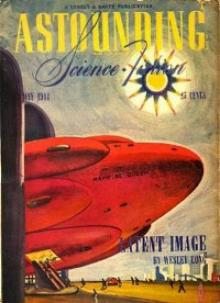 The Yehudi Principle
The Yehudi Principle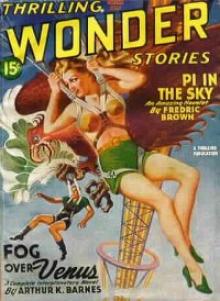 Pi in the Sky
Pi in the Sky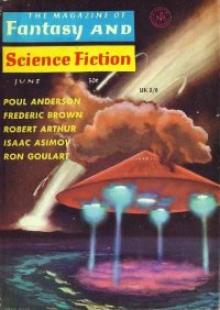 Eine Kleine Nachtmusik
Eine Kleine Nachtmusik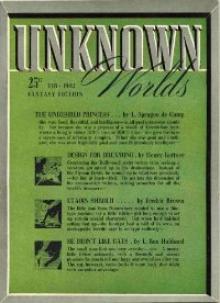 Etaoin Shrdlu
Etaoin Shrdlu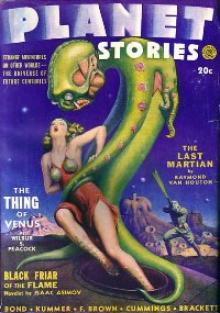 The Star Mouse
The Star Mouse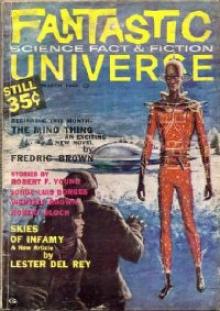 The Mind Thing
The Mind Thing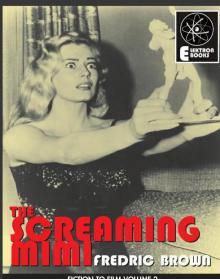 The Screaming Mimi
The Screaming Mimi The Fabulous Clipjoint
The Fabulous Clipjoint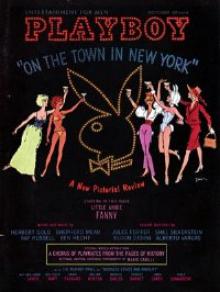 Puppet Show
Puppet Show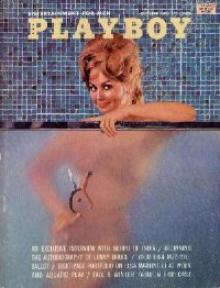 It Didn't Happen
It Didn't Happen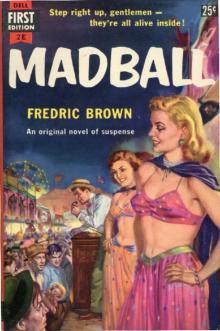 Madball
Madball Happy Ending
Happy Ending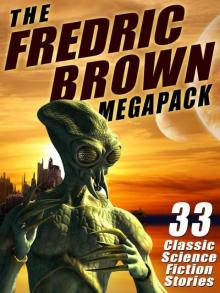 The Fredric Brown Megapack: 33 Classic Science Fiction Stories
The Fredric Brown Megapack: 33 Classic Science Fiction Stories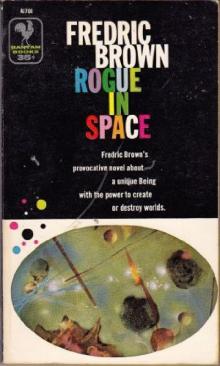 Rogue in Space
Rogue in Space Night of the Jabberwock
Night of the Jabberwock The Dead Ringer
The Dead Ringer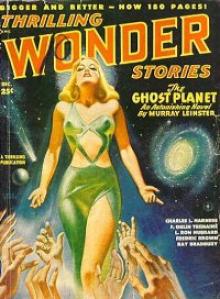 Knock
Knock We All Killed Grandma
We All Killed Grandma Space On My Hands
Space On My Hands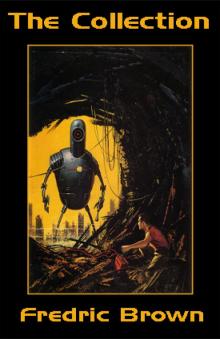 The Collection
The Collection The Second Fredric Brown Megapack: 27 Classic Science Fiction Stories
The Second Fredric Brown Megapack: 27 Classic Science Fiction Stories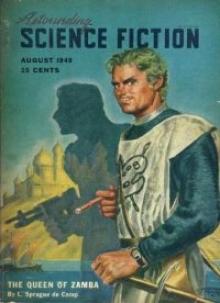 Letter to a Phoenix
Letter to a Phoenix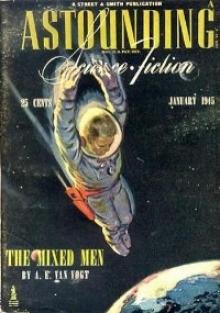 The Waveries
The Waveries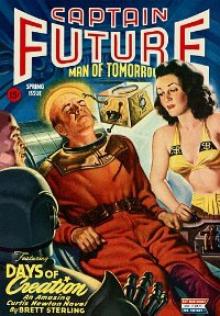 Nothing Sirius
Nothing Sirius The Deep End
The Deep End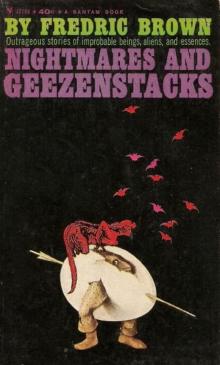 Nightmares & Geezenstacks
Nightmares & Geezenstacks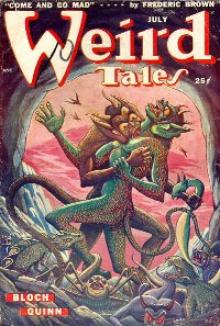 Come and Go Mad
Come and Go Mad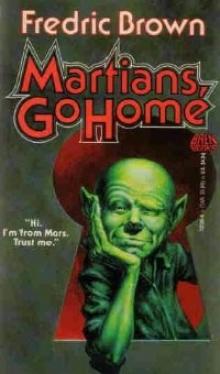 Martians, Go Home
Martians, Go Home